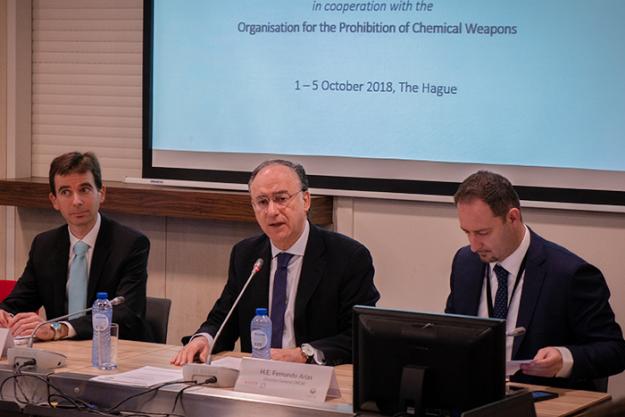
OPCW Director- General, Ambassador Fernando Arias, delivering the keynote address at the opening of the Asser Institute’s Training Programme on Disarmament and Non-Proliferation of Weapons of Mass Destruction
THE HAGUE, Netherlands — 1 October 2018 — The Director-General of the Organisation for the Prohibition of Chemical Weapons (OPCW), Ambassador Fernando Arias, delivered today the keynote address at the opening of the Asser Institute’s Ninth Annual Training Programme on Disarmament and Non-Proliferation of Weapons of Mass Destruction (WMD), which is jointly organised with the OPCW and takes place in The Hague.
The training course, taking place from 1-5 October, will provide clear insights for mid-career professionals into the legal, scientific, diplomatic and geo-political issues relating to chemical weapons and other WMDs in the contemporary world.
In his keynote speech, Ambassador Arias reminded the attendees that: “Disarmament and non-proliferation are not simple issues that lend themselves to simple solutions. They require specialised knowledge and training in a variety of cross-cutting areas, both technical and non-technical in nature.”
After describing the various challenges to the global norm against chemical weapons, the Director-General encouraged the future policy makers, implementers, and influencers to use this training to acquire a comprehensive overview of the different perspectives on WMD disarmament, and to become “better contributors to multilateral action”.
Throughout the week, the participants will learn from leading WMD experts, including those from the OPCW who will provide insights into the Organisation’s achievements and challenges in the implementation of the Chemical Weapons Convention, the OPCW inspection and verification regime, the role of science in bio-chemical disarmament, and the growing threat of chemical terrorism.
The course also features field visits to the OPCW Laboratory in Rijswijk and to the nuclear research reactor at Delft University of Technology.
Background
The T.M.C Asser Institute and the OPCW launched the Programme on Disarmament and Non-Proliferation of WMDs in 2010.
The programme has established itself as a highly regarded educational resource for advanced graduate students and early- to mid-career professionals with interests in WMD diplomacy and treaty implementation. The WMD training programme continually evolves and addresses cross-cutting aspects in high-level panels and interactive elements such as a debate and simulation exercises.
As the implementing body for the Chemical Weapons Convention, the OPCW, with its 193 Member States, oversees the global endeavour to permanently eliminate chemical weapons. Since the Convention’s entry into force in 1997, it is the most successful disarmament treaty eliminating an entire class of weapons of mass destruction.
Over 96% of all chemical weapon stockpiles declared by possessor States have been destroyed under OPCW verification. For its extensive efforts in eliminating chemical weapons, the OPCW received the 2013 Nobel Peace Prize.
More Information
- Keynote Address by Director-General of the OPCW, Fernando Arias, at the Asser Institute’s Ninth Annual WMD Training Programme Disarmament and Non-Proliferation of Weapons of Mass Destruction in a Changing World
- Asser Institute Annual WMD Training Programme
- Asser WMD School Agenda 2018
- OPCW Fact Sheets
